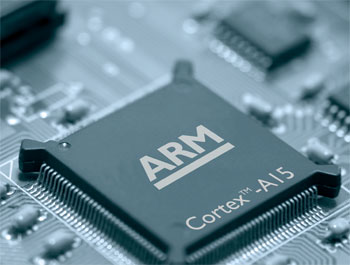Surge In IoT Projects Helps ARM Shrug Off Smartphone Slowdown

Smartphone slowdown? ARM posts record profit and sales, but market frets over future and shares tumble
British chip designer ARM Holdings’ domination of the smartphone and Internet of Things (IoT) market has helped lead to healthy fourth quarter and full year results.
The positive financials came despite market fears about Chinese growth rates and a global smartphone slowdown.
Strong Results
For years now ARM has dominated the smartphone market. The firm says that chips based on its design are now used by 80 percent of the planet’s population.
This has helped ARM bring in impressive financial results in recent years, but Cambridge-based company has not been idle and has taken careful note of the slowdown in global smartphone shipments. This helped motivate its move into other sectors including servers and mobile computing. It is also expanded into the Internet of things (IoT) sector.
And ARM’s strategy has paid off handsomely during 2015.
 For the fourth quarter ending 31 December it posted a net profit of £91.7m, up from £72.8m in the same year-ago quarter. Quarterly sales also rose an impressive 19 percent to £269.1m, from £225.9m a year earlier.
For the fourth quarter ending 31 December it posted a net profit of £91.7m, up from £72.8m in the same year-ago quarter. Quarterly sales also rose an impressive 19 percent to £269.1m, from £225.9m a year earlier.
And there was equally good news for the annual results, where FY2015 profit rose to £339.7m, from £255.4m in FY2014. Sales meanwhile rose 22 percent to £968.3m from £795.2m in FY2014.
Apple reportedly contributes around 5 percent of ARM’s revenue, but IoT is helping in the face of slowing smartphone shipments, as 55 percent of ARM’s shipments are now for non-mobile uses.
“2015 was a strong year for the shipment of chips containing advanced ARM technology, and momentum continued through the fourth quarter,” said CEO Simon Segars. “During the year ARMv8-A surpassed 50 percent share of smartphone shipments, Mali became the industry’s highest-shipping GPU architecture, and our Partners increased their shipments into enterprise infrastructure and embedded markets.”
“Demand for our technology is increasing, and during the quarter we signed multiple licences for the next generation of high-performance and secure ARM processors,” said Segars. “Our increased investments in both 2015 and 2016 will help us meet demand by extending the capabilities of our technology and the ecosystem, and will support long-term growth and returns for shareholders.”
ARM’s v8 architecture is assisting the company’s bottom line, as analysts reportedly indicate it commands 30 percent higher royalties than its forerunner. This helped drive strong growth in royalty payments (a 31 percent quarterly increase).
http://www.techweekeurope.co.uk/mobility/arm-results-iot-smartphones-licenses-173061
Yet despite the solid results, the market remains bear-like and ARM’s shares took a bit of a hammering, falling 5 percent in early trading.
IoT Acquisitions
ARM meanwhile continues to look to acquisitions to help drive growth, mostly concentrated on the Internet of Things (IoT) sector.
Last February for example ARM acquired Dutch IoT specialist Offspark. Offspark specialises in IoT communications security and its PolarSSL technology is already deployed in sensors, communication modules, and smartphones.
Then in July 2015, it acquired Israeli IoT security firm Sansa Security to boost the safety of its system-on-chip components.
In the past year it also purchased Bluetooth Smart stack provider Wicentric, a firm that supplies Bluetooth software that enables the development of low-power wireless products. It also acquired Sunrise Micro Devices (SMD), which provides sub-one volt Bluetooth radio intellectual property (IP).
What do you know about ARM? Take our quiz!